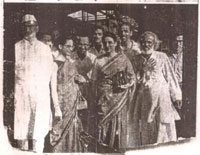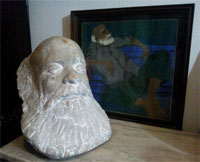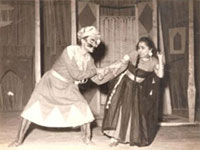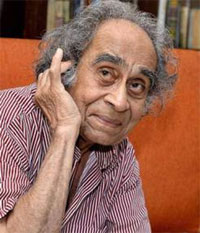|
|
 |
|
|
Group photo. 1959. At rehearsal
hall. Front row (l-r): b.h.zaidi,
shama zaidi, qudsia
zaidi, niaz haider |
| Every naatak mandli, theatre troupe, has its floaters and its fixtures, those people who wander in and out of plays, and those who are permanent productions in themselves. Two such ever-present figures in the Hindustani Theatre were Irshad Panjatan and Niaz Haider, both of whom were instrumental in bringing to life Begum Qudsia Zaidi's vision for her theatre.
Irshad, today fondly known as Tom, is best known as a pantomime artist. He can also be seen in films like Chetan Anand's Heer Ranjha and K.A. Abbas's Saat Hindustani. Some of his formative years, however, were spent with the Hindustani Theatre. Originally from Hyderabad, Irshad met Qudsia on a sightseeing trip to Delhi, during which time he was staying with his brother, Abid. On his third day there, as he was about to leave to see the Red Fort, a servant entered Irshad's room to say, 'Begum Zaidi is waiting for you in the drawing room'. He did not know a Begum Zaidi, but the servant insisted the matter was of utmost importance, so Irshad agreed to go down. Draped in a yellow silk sari, her black-and-white hair knotted in a bun, Qudsia waited in perfect posture for Irshad. He entered the room, perplexed to find this 'attractive woman in her forties' as she rose and politely greeted him, "Aadaab". She began to tell him about her and Habib Tanvir's idea of a Hindustani Theatre, of staging Sanskrit and world classics in the more accessible language of Hindustani. She invited Irshad to see her production of Khalid ki Khala (a Hindustani adaptation of Brandon Thomas's Charley's Aunt) that evening. Irshad decided to stay on in Delhi, and for the next three-and-half years worked closely with Qudsia, until she died in 1960.
Within a month of Irshad's joining the troupe, the Hindustani Theatre found its home: a small house with a large hall behind it at 22 Low-Cost-Housing, Exhibition Ground, Mathura Road, New Delhi. Today, this old rehearsal space has faded into the expanse called Pragati Maidan. With an established rehearsal space and office, the theatre was ready to take on what would become some of its most popular productions. Qudsia asked Irshad to a meeting at Scindia House about Mitti Ki Gaadi, her translation of Shudraka's Sanksrit play, Mrichchakatika. Niaz Haider, fondly known as Niaz Baba, was writing the verse for this production. Originally from Hyderabad, he had been introduced to the Hindustani Theatre in Delhi by Communist Party member, Sajjad Zaheer. Quite surprisingly, the very fickle Niaz (who was also a member of the Progressive Writers Association) had actually shown up at Scindia House. Balding and heavily bearded, wearing his typical kurta-pajama, he was waiting for his colleagues. 'If his beard did not see scissors for a long period', Irshad remembers, 'he resembled Karl Marx'. When Qudsia arrived at the meeting she showed Niaz the scenes she had translated. He read one very quickly and marked it in pencil with an 'x', before tossing it aside and walking away, as if he had rejected it. 'But it meant,' Irshad explains, 'that this scene was finished in his mind'.
Niaz Baba left the meeting and walked out of Scindia House. Irshad and Dhingra, another member of the Hindustani Theatre, followed him. Niaz stopped at a liquor shop to buy and gulp half a bottle of rum in a single breath.Then, he led Irshad and Dhingra in silence all the way to a bhaang shop in Chandni Chowk. He bought himself a glass of particularly strong bhaang, dipped his finger in, and flicked a drop towards the heavens, exclaiming, 'Jai Shankar!', before downing the cannabis brew. Then, he turned to Dhingra and Irshad and said, 'I need a place to sit, under a tree'. They found him a spot where he sat down and began to rapidly recite verse dialogues for Mitti Ki Gaadi - Dhingra, with pen and paper, tried his best to keep up. When he was done, Niaz went away to, as Irshad says, 'God knows where'. And so were written several verses for the Hindustani Theatre's plays, for Ambapali, Shakuntala, Mudrarakshas. Often, Niaz Baba would abandon his verses half-way - famously, he once went in search of Brindavan, leaving Habib to finish penning the songs for Mudrarakshas. To many Niaz Baba was a rebel, to some he was a qalander, a mystical wanderer, and to most he was simply a madman. He hated bathing, and when Sathyu and Shama, who were also part of the Theatre, forced him to bathe, he would toss water at the bathroom walls to make it sound as if he were bathing, when in fact he was finishing off a pauwa of rum. Irshad recalls of Niaz, 'The intellectuals gave him respect and the theatre artists, love. And I found in him all the qualities of a high-calibre artist, who sometimes lands in insanity'. Gossip has it that Qudsia sometimes locked Niaz Baba in a room, only so that he would finish his verses for her. Though, of course, the truth was that she loved him with all his eccentricities; they made a good theatrical team. In one letter to Irshad in 1959, Qudsia writes, 'Give my love to Niaz and thank him for being such a source of strength for the theatre and particularly for me'. .
|
 |
|
|
Face cast of niaz haider
made at the berliner ensemble.
oil pastel drawing of niaz
haider made by seema sathyu. |
| Mitti Ki Gaadi was to be a production that would push the formal boundaries of the theatre of its times. The script was a mixture of verse and straight dialogue, and the actors were trained in movement even before the actual rehearsals began. Zohra Sehgal was called in to conduct this movement training, and Habib Tanvir, who had just returned from Europe, directed the play, his new techniques in tow. Two Chattisgarhi actors, Madan Lal and Lalu Ram, also joined the production, while M.S.Sathyu designed the sets and Shama Zaidi, the costumes. But as the opening show drew closer, Irshad, who had his hands in several departments, was struck by personal tragedy: the death of his brother. Irshad left for Hyderabad for the funeral, leaving the production to stand on its own for a while.
When Irshad returned to Delhi a few days later, Qudsia's driver, Pyaare, arrived at his doorstep with the message that 'Begum Zaidi is waiting in the car'. Irshad went down to see her, and as she offered him her condolences, he told her that Ayama, his childhood nanny, was terribly grieving. Qudsia went up to the flat and held Ayama in her arms. The women wept and talked and wept. Ayama opened her paandaan and offered a piece of paan to Qudsia who, Irshad says, 'got up from the sofa and saluted [Ayama] to thank her in the perfect way used to give respect to a noble lady'. In spite of her elitism there was something about Qudsia that both upheld and defied the constraints of custom and class. 'Maybe it was because of this attitude of hers', Irshad admits, 'that I persisted to call her 'Begum Sahib', even when practically everybody around her addressed her as 'Apa''.
Mitti Ki Gaadi opened in 1958 to a full house at the All India Fine Arts and Crafts Society in Delhi. The Prime Minister of India, Jawaharlal Nehru was in the audience. But the expectant crowd received a play they hadn't quite imagined. The actors, some in daily clothes even, paced through the audience, reciting, 'Hum hain naye nautanki waale', 'We are the new theatre people'. Their entry was improvised, something that just wasn't done in Delhi theatre in those days. Even Irshad was clueless about this entrance until the show itself! 'The production was good', Irshad remembers, but the play received incredibly mixed reviews and the tag of being a little too 'experimental'. Regular theatre-goers started to become dismissive of Habib's work, and Qudsia, overwhelmed by this response, lost faith in Habib; she refused to give him her next production, Shakuntala. Habib, the co-founder of the group, now threatened to leave, and several actors threatened to follow him. Important theatre people began to intervene to salvage the situation. Sajjad Zaheer, member of the Communist Party and of the Indian People's Theatre Association, convened a meeting with Habib, Niaz, and Irshad. But the meeting, too, fell apart when Habib remarked, much to Zaheer's disliking, 'Indira Gandhi will be Prime Minister of India one day'. A shouting match ensued and Niaz attacked Habib with personal insults. Irshad snuck away from the room. Habib would leave, too, to found what would become the legendary Naya Theatre.
|
 |
|
|
“Vasantasena” with OP Dhingra
and Asha Valentine. |
| Qudsia tried to sustain Mitti Ki Gaadi without Habib, changing several actors and the composer, and the name of the play to Vasantasena. She wrote to Irshad, 'Replacement of artists should be done very carefully, without much disturbance', but the production had been affected by the split, and the performers refused to show up to rehearsal consistently. At the same time, Irshad, who had taken over the choreography was making his own artistic discoveries. Habib had originally played the part of Sharvilaka, but the actor who replaced him could not sing like Habib. Irshad altered the part so that the actor had to merely mouth words sung by someone else in the wings, but soon found that it was much more interesting when the actor just moved in narration, without singing. One evening, when Irshad was practicing this silent part alone and without music, the critic, Charles Fabri walked into the rehearsal hall. 'That was a very good pantomime!' the critic said to Irshad. When Irshad revealed that he had no idea what that was, Fabri said, 'I will get a book on pantomime for you'. Irshad had unknowingly started to come upon his own style of mime within the Hindustani Theatre. One day he showed three mime acts to Qudsia. She sat through all without any reaction. A few silent moments after the third act, Qudsia began clapping loudly, filling the empty rehearsal hall with her applause. Irshad stared, nervous. She said to him, 'Today two hands are clapping, but if you continue to work at this, one day a thousand hands will clap'.
Irshad continued to work through the Hindustani Theatre's following productions, joining hands with Niaz and Sathyu once again to restage the group's most controversial production, Shakuntala. Irshad played the role of Vidushaka. Even before the play opened, the press was filled with arguments against the production. Some Sanskritists and Hindi writers objected to Qudsia's Urdu translation and claimed that Niaz's poetry was an insult to the Sanskrit original. Open letters littered the press, and in her last letter Qudsia urged audiences to first watch Shakuntala before criticizing it. The play opened to surprising success, and some of its initial critics even reversed their stance. Nehru, too, seemed to enjoy the play, Irshad recalls, he brought foreign dignitaries to several of the shows. At one such show, President Nasser of Egypt was sitting in the audience.
|
 |
|
|
Irshad Panjatan |
| The next play the group took on was Ambapali, adapted by Qudsia, with verse by Niaz. Sathyu directed, while Irshad, as usual, was part of everything. The production travelled MP, Bihar and Bengal, while Qudsia in Delhi began to collect funds for a theatre building to be run by the Hindustani Theatre. The space was to be named 'Sardar Vallabhbhai Patel Theatre'. The troupe travelled in a railway wagon, stopping by small villages for the night. They would eat, and drink, and sing by railway tracks, under a blanket of starry sky. One night, Irshad was shaken awake. 'Get up, get up', Dhingra's voice repeated. They walked to the railway house where Sathyu was standing with other group members in absolute silence, in his hand, the telegram announcing Qudsia's sudden death.
When the troupe eventually returned to Delhi, having completed their tour, the president of the Hindustani Theatre, Begum Pataudi, called a meeting. She said that she had neither the energy nor the talent to raise funds and run a theatre the way Qudsia had. Nobody else from the executive committee was willing to take up the administration - the accounts, the expenditures - either. Some artists considered taking the whole thing into their hands, including the future project of the Vallabhbhai Patel Theatre, but that didn't move much beyond dreaming. Other than an unsteady period between 1962-3, when it was briefly revived, the Hindustani Theatre wrapped up for good.
A disillusioned Irshad left the Theatre to mesmerise Indian audiences with his silent wit and movement; eventually he would move to Germany, where he continues to perform mime today. Niaz Baba, on the other hand, had a little more hope for the Hindustani Theatre, though perhaps a little too much faith in politics; he set up a tent outside the Prime Minister's house and went on a hunger strike.
This post was put together through the letters of Qudsia Zaidi and the recollections of M.S. Sathyu and Shama Zaidi. The post would have been impossible, however, without the help of Irshad Panjatan, who very kindly allowed me to borrow from his unpublished memoirs - a very big and warm thank you to Tom Uncle.
This article was first published on the blog- www.begumqudsiazaidi.wordpress.com that has been created in memory of Begum Qudsia Zaidi. You can follow the Facebook link- https://www.facebook.com/BegumQudsiaZaidi for further posts and can also write to [email protected] to share your feedback or to know more about this initiative.
|